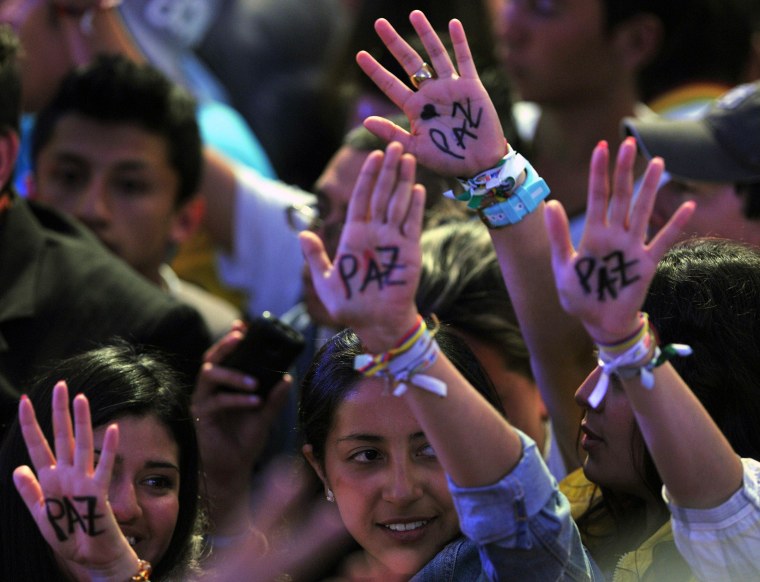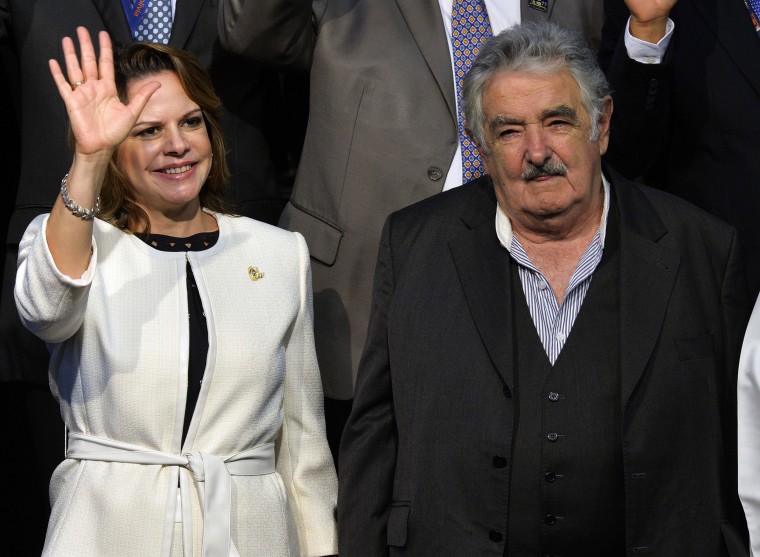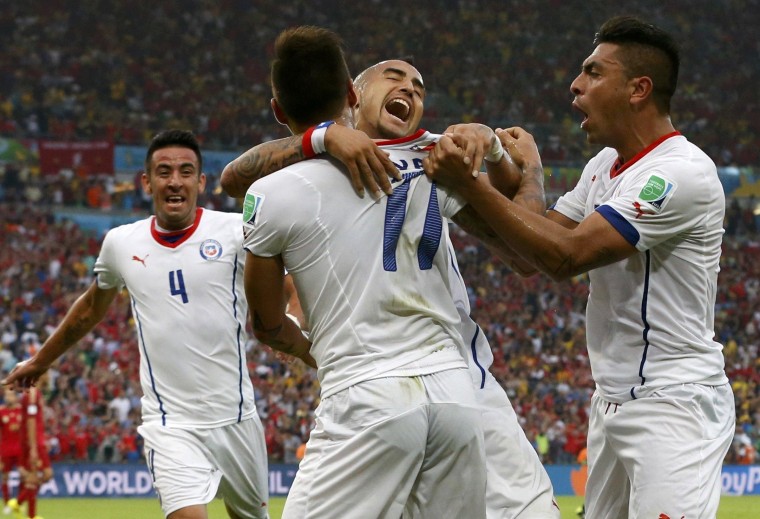LIMA, Peru — So, down South America way, it’s just one big soccer fest right now, huh?
Wrong, of course. There’s actually been no shortage of “real” news going on in the region that has nothing to do with Lionel Messi, Cristiano Ronaldo or any of the other overpaid but superlatively talented stars of the World Cup.
Here are five of the most interesting developments you might have missed:
1. Colombia's peace talks are back on track

After half a century of fighting and nearly 250,000 dead, the end may now be in sight for Colombia’s armed conflict — but only just after a down-to-the-wire presidential election on Sunday.
President Juan Manuel Santos, who ran on a platform of seeing through peace talks with the Revolutionary Armed Forces of Colombia (FARC), won re-election with about 51 percent of the vote over his conservative opponent Oscar Ivan Zuluaga’s 45 percent.
Zuluaga wanted to halt the talks and instead crush the Marxist armed rebels militarily — a strategy that, the armed forces’ recent victories notwithstanding, has failed to work for the last 50 years.
Many Colombians are opposed to allowing the rebels, who fund their war with kidnappings and cocaine, to escape jail, never mind participate in democratic elections.
Santos has said there will be no impunity, raising the possibility that even some of the FARC negotiators might face jail time as part of any peace deal.
The road to a negotiated, political end to Colombia’s civil war still remains long and winding — but at least it no longer has a dead end.
2. Will Argentina default again?
Argentina’s $100-billion debt default in 2002, the world’s largest ever, has just come back to haunt the South American nation in a big way.
What happened? On Monday, the US Supreme Court decided not to hear an appeal from the administration of President Cristina Fernandez de Kirchner against a lower court ruling that would force Argentina to finally pay $1.7 billion of its bad debt to what the government calls “vulture funds.”
Back in the early 2000s, the government of her late husband and then-president, Nestor Kirchner, had reached a deal with more than 90 percent of its creditors that would pay them just 30 cents on the dollar.
A few creditors held out, however, including hedge funds that had gobbled up the bad debt on the cheap with the aim of enforcing payment.
If Argentina doesn’t also pay the funds at the end of this month — something Fernandez de Kirchner has vowed never to do — when it pays its other creditors, the nation will, once again, be in technical default.
3. Venezuela trapped in crisis mode

The turmoil in Venezuela may have slipped off the front pages, but the South American country remains mired in economic crisis and serious anti-government unrest.
Inflation is now predicted to hit 70 percent this year, while the latest reported goods shortage is of coffins — no small matter in a nation with a sky-high homicide rate.
Meanwhile, the response from President Nicolas Maduro to his critics has grown even more repressive. As if locking up politician Leopoldo Lopez — and turning him into the continent’s most famous political prisoner — was not enough, the courts are now moving to jail four other opposition leaders, accusing them of orchestrating a coup.
Maduro is also attempting to sack the wife of a jailed opposition mayor, elected by 73 percent in May to replace her ousted husband. The president claims that, like her spouse previously, she is illegally supporting the anti-government street protests.
4. World leaders, lots of them, meet in Bolivia

A huge group of world leaders, including United Nations Secretary-General Ban Ki-moon, met in the Bolivian city of Santa Cruz last weekend.
Known as the G77 — despite now having 133 members — the alliance of developing nations is a kind of poor-man’s G7. They were joined by representatives of China, which is not usually part of the group.
Unable to wield the clout of the G7 members, who collectively account for 40 percent of global GDP, the G77 also has difficulty agreeing on much. That is in part, experts say, thanks to its size.
Host Evo Morales, president of Bolivia, got things underway with a call for an end to the UN Security Council, dominated by the United States, Britain, China, France and Russia.
Uruguay’s President Jose Mujica, famous for driving a VW Beetle and showing up for work in sandals, continued the theme, with a stinging attack on industrialized nations’ consumerism and “culture of waste.”
5. Ganja decriminalized
And now to add a notable Caribbean headline to the mix. Somewhere in heaven, Bob Marleyand Peter Tosh may just have lit up an extra-fat joint in celebration.
The late reggae greats — and hardcore marijuana, uh, enthusiasts — have just had one of their dearest wishes granted: Jamaica is finally going to decriminalize “ganja,” as the soft drug is known on the island. From now on, people caught with up to 2 ounces of weed — which is actually a rather generous amount for personal consumption — will be given a small fine but not arrested.
Politicians in Kingston have long wanted to make the move, and free up the overstretched police and courts to focus on the violent criminals who plague Jamaican society. One reason they never previously did so was concern of backlash from the White House.
But now, after decriminalization in the US states of Colorado and Washington, and full-on legalization in Uruguay, Jamaica’s move almost seems anti-climactic.
This story was first published in GlobalPost.
Other stories from GlobalPost:
This Indian city is on a quest to get rid of shantytowns
Are any countries seriously trying to tackle the climate crisis?
Trash fish: it's gross, tainted by slavery and possibly in your dog food
